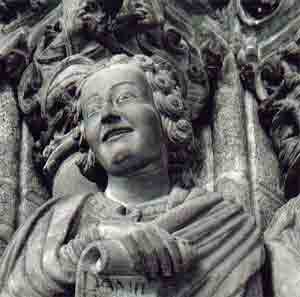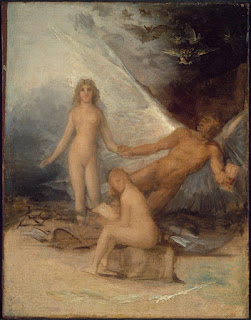@wendelldaily
— Guillermo Ruiz Zapatero (@ruiz_zapatero) January 31, 2022
ELEPHANTS AT THE SNOWED HIGHWAYS
THE VISION ASSAULTING HER BEFORE DAWN
HE WAS HANNIBAL
CROSSING THE ALPS
2.240 YEARS AGO
AND HE KNOWED WITHOUT DOUBT
THAT WHAT IS AT STAKE
IS NOT NOW ROMA'S OR CARTAG0'S FATE pic.twitter.com/czpzS6qUzL
El blog pretende publicar, principalmente, traducciones al español de textos y poemas de Henry David Thoreau y referencias a trabajos sobre dicho autor.
LIcencia Creative Commons

Esta obra está bajo una Licencia Creative Commons Atribución-NoComercial-SinDerivadas 4.0 Internacional.
Sunday, January 30, 2022
ELEPHANTS AT THE SNOWED HIGHWAYS
Friday, January 28, 2022
28-01-2022 (SANTO TOMÁS (THE DUMB OX), PLURALISMO DE LAS CAUSAS CON HIELO)
"St. Thomas Aquinas closely resembles the great Professor Huxley, the Agnostic who invented the word Agnosticism. He is like him in his way of starting the argument, and he is unlike everybody else, before and after, until the Huxleyan age. He adopts almost literally the Huxleyan definition of the Agnostic method; "To follow reason as far as it will go"; the only question is--where does it go? He lays down the almost startlingly modern or materialist statement; "Every thing that is in the intellect has been in the senses". This is where he began, as much as any modern man of science, nay, as much as any modern materialist who can now hardly be called a man of science; at the very opposite end of enquiry from that of the mere mystic. The Platonists, or at least the Neo-Platonists, all tended to the view that the mind was lit entirely from within; St. Thomas insisted that it was lit by five windows, that we call the windows of the senses.But he wanted the 135 light from without to shine on what was within. He wanted to study the nature of Man, and not merely of such moss and mushrooms as he might see through the window, and which he valued as the first enlightening experience of man.
(...)
Most Monist moralists simply said that Man has no choice; but he must think and act heroically as if he had. Huxley made morality, and even Victorian morality, in the exact sense, supernatural. He said it had arbitrary rights above nature; a sort of theology without theism.
(...)
And for him the point is always that Man is not a balloon going up into the sky nor a mole burrowing merely in the earth; but rather a thing like a tree, whose roots are fed from the earth, while its highest branches seem to rise almost to the stars.
(...)
But in a general sense there has entered that primeval world of pure actuality, the division and dilemma that brings the ultimate sort of war into the world; the everlasting duel between Yes and No. This is the dilemma that many sceptics have darkened the universe and dissolved the mind solely in order to escape. They are those who maintain that there is something that is both Yes and No. I do not know whether they pronounce it Yo.
(...)
Ice is melted into cold water and cold water is heated into hot water; it cannot be all three at once. But this does not make water unreal or even relative; it only means that its being is limited to being one thing at a time.
(...)
But Aquinas says he sees no particular reason, in reason, why this world should not be a world without end; or even without beginning.
(...)
To sum up; the reality of things, the mutability of things, the diversity of things, and all other such things that can be attributed to things, is followed carefully by the medieval philosopher, without losing touch with the original point of the reality (...) He is a realist in a rather curious sense of his own, which is a third thing, distinct from the almost contrary medieval and modern meanings of the word. Even the doubts and difficulties about reality have driven him to believe in more reality rather than less. The deceitfulness of things which has had so sad an effect on so many sages, has almost a contrary effect on this sage. If things deceive us, it is by being more real than they seem."
28-01-2022 (SANTO TOMÁS, PLURALISMO DE LAS CAUSAS CON HIELO, (I))
UN #ESTUPIDO ES ALGUIEN QUE NO PUEDE ABANDONAR NUNCA SU #CAUSA PORQUE SOLO SIGUE SU CAUSA. Y PIENSA QUE TU CAUSA ES SU CAUSA. ES COBARDE Y DICTATORIAL. LA #PLURALIDAD DE #CAUSAS ES #CONDICIÓN NECESARIA PERO NO SUFICIENTE DE CUALQUIER ACIERTO pic.twitter.com/Nnbg3TAbP6
— Guillermo Ruiz Zapatero (@ruiz_zapatero) January 18, 2022
Wednesday, January 26, 2022
USA TRUCKERS ROLLING TO CANADA AS WELL
CANADIAN TRUCKERS AND THOREAU (II)
They who have been bred in the school of politics fail now and always to face the facts. Their measures are half measures and makeshifts merely. They put off the day of settlement indefinitely, and meanwhile the debt accumulates. HDTWhat’s happening in Canada is amazing. Truckers are driving across the country in a massive caravan and freedom loving people are meeting them along the way to cheer them on. This is the type of protest that can be VERY effective. pic.twitter.com/0VqDVdjh9S
— Robby Starbuck (@robbystarbuck) January 25, 2022
CANADIAN TRUCKERS AND THOREAU
HDT
Saturday, January 22, 2022
Thursday, January 20, 2022
UN ELEFANTE EN LA NIEVE
Un elefante en la nieve
— Guillermo Ruiz Zapatero (@ruiz_zapatero) January 20, 2022
la visión que le asaltó en la madrugada
era Aníbal cruzando los Alpes
hace 2.240 años
Y él sabía sin duda
que esta vez se jugaba
no solo el destino de Roma y Cartago pic.twitter.com/tKwZFVUIVn
Monday, January 17, 2022
SER AUTÓNOMO SERÁ CONSTITUTIVO DE DELITO (EL MUNDO TODAY)
Ser #autónomo será #constitutivo de #delito a partir de 2023 https://t.co/tRH7U7qF0A via @elmundotoday
— Guillermo Ruiz Zapatero (@ruiz_zapatero) January 18, 2022
“Hasta ahora hemos sido muy blandos con los autónomos, pero eso se acabó”
Sunday, January 16, 2022
DE LOS PROVERBIOS DEL INFIERNO A LA MISERICORDIA Y REGRESO (WILLIAM BLAKE Y PAUL CELAN, 1996+2022)
Saturday, January 15, 2022
HENRY IV Y LA CIENCIA (IV, COMO HENRY IV)
Nuestra sociedad piensa y proclama que la ciencia -y sobre todos los científicos- son más importantes que "Shakespeare" y los comunes
— Guillermo Ruiz Zapatero (@ruiz_zapatero) January 14, 2022
Y eso, simplemente, no es verdad
Filosóficamente
HENRY IV Y LA CIENCIA (III)
@JesusGilVilda
— Guillermo Ruiz Zapatero (@ruiz_zapatero) January 14, 2022
Me temo que sin la pasión y la honestidad de "Shakespeare" ("while you live") la ciencia-y la sociedad- no son posibles
No es una mera cuestión de método https://t.co/xzxWzJoc5d
HENRY IV Y LA CIENCIA (II)
https://t.co/bSWxxc9Thr pic.twitter.com/3vmBa5hNqY
— Guillermo Ruiz Zapatero (@ruiz_zapatero) January 14, 2022
HENRY IV Y LA CIENCIA (I)
EL ESTADO Y EL CUERPO (#THOREAU, 24 DE AGOSTO DE 2021-13 DE ENERO 2022) https://t.co/mfZdI33Atx @WendellDaily
— Guillermo Ruiz Zapatero (@ruiz_zapatero) January 14, 2022
They only can force me who obey a higher law than I They force me to become like themselves I do not hear of men being forced to live this way or that by masses of men pic.twitter.com/BZL7wKyJ6W
Friday, January 14, 2022
Thursday, January 13, 2022
EL ESTADO Y EL CUERPO (THOREAU, 24 DE AGOSTO DE 2021-13 DE ENERO 2022)
El Estado nunca se enfrenta voluntariamente con la conciencia intelectual o moral de un hombre sino con su cuerpo, con sus sentidos.No se arma de honradez o inteligencia sino que recurre a la simple fuerza física.Yo no he nacido para ser violentado.Seguiré mi propio camino.Veremos quién es el más fuerte.¿Qué fuerza tiene la multitud?.Sólo pueden obligarme aquellos que obedecen a una ley superior a la mía.Me obligan a ser como ellos.Yo no oigo que a los hombres les obliguen a vivir de tal o cual manera las masas.¿Qué vida sería ésa?,Cuando veo que un gobierno me dice:"La bolsa o la vida", ¿por qué voy a apresurarme a darle mi dinero?.Puede que se halle en grandes aprietos y no sepa qué hacer.Yo no puedo hacer nada por él.Debe salvarse a sí mismo como hago yo.No merece la pena lloriquear.Yo no soy el responsable del buen funcionamiento de la máquina de la sociedad.Yo no soy el hijo del maquinista.
(..)
Si una planta no puede vivir de acuerdo con su naturaleza muere, y lo mismo le ocurre al hombre.
“Cada uno debe ser-por lo menos- dueño de su propia muerte. La integridad depende de eso.
- ¿Usted sabe lo que es la integridad?
-Hubiera usado la integridad para no matar a gente inocente”
(Ricardo Piglia, “El camino de Ida”.Editorial Anagrama)
https://thoreaucastellano.blogspot.com/2015/01/este-es-tu-texto.html
PIGLIA NO ESTÁ HABLANDO DEL "SER PARA LA MUERTE" ESTÁ HABLANDO DEL CUERPO, POR ESO AÑADE LO QUE SIGUE
Tuesday, January 11, 2022
SANGRE Y HUMANIDAD (VI, VARLAM SHALAMOV VS. COWARDS)
@RadCentrism @CharlesRixey
— Guillermo Ruiz Zapatero (@ruiz_zapatero) January 11, 2022
MOST THINGS ARE NOT EVIL VS. GOOD
THEY ARE COWARDS VS. NOT-COWARDS#VARLAMSHALAMOV
31. I learned that world should be divided not into good and bad people but into #cowards and #non-cowards. 95% of cowards are capable of lethal meanness https://t.co/x0NtH0WEq9 pic.twitter.com/SeKXzAxMYB
Sunday, January 09, 2022
THOREAU, PRINCIPALMENTE: (12-12-2008+9-01-2022: SANGRE Y HUMANIDAD (V), EL GRAN INQUISIDOR)
Friday, January 07, 2022
SANGRE Y MÁQUINAS (IV, 7-01-2022, JUSTICE SOTOMAYOR)
Phil Kerpen@kerpen@andrewbostom #Sotomayor
Because #machines have no #blood, are not bloodborne ... and do not bleed
They have also #viruses running in silico but not blood
You can not run blood in silico
A #humanbeing does it while alife. This is the difference your honor https://t.co/5NAS5sudeA— Guillermo Ruiz Zapatero (@ruiz_zapatero) January 8, 2022
SANGRE Y HUMANIDAD (III, 7-01-2022+9-07-2001)
…la esencia de la ornamentación islámica no reside en aquello que parece en un principio, no consiste en el empleo genial de la geometría, sino en la utilización de ese instrumento para que el chispeante y frágil dibujo señale la unidad de las múltiples experiencias, la unidad que como una red lo contiene todo, ya que la estructura geométrica que el espíritu árabe usa a través de las culturas griega e hindú y china y persa hace realidad una idea, la propuesta de que elijamos algo superior al mundo de la desintegración del caos maligno, un mundo superior que lo sostiene todo, una unidad gigantesca, es esto lo que podemos elegir (…)
No saber algo es un proceso complejo cuya historia discurre a la sombra de la verdad. Y la verdad existe. Ya que existe la Alhambra. He ahí la verdad”
(Lejana autorización, László Krasznahorkai)
Y la verdad existe… ya que existen, en una parte de la unidad, la sangre humana, que otros derramaron por nosotros, la calle del Cristo de la Vera Cruz y el Museum Fine Arts de Boston, y Lynn Margulis, y Francisco de Goya y Lucientes y San Baudelio de Berlanga y los dos cuadros en el Museo citado y abajo reproducidos y las entradas que dieron acceso a los mismos el 9 de julio de 2001, en Boston (Massachusetts), cerca de Concord, del Sleepy Hollow Cemetery, de Walden y de Henry David Thoreau…
Un metro de DNA por cromosoma multiplicado por 46 cromosomas que contiene cada célula hacen 46 metros de DNA por célula; multiplicado por un billón de células que hay en el cuerpo dan un total de 46 billones de metros de DNA en el cuerpo de una persona. La luna está sólo a 200.000 millones de metros de distancia
(Lynn Margulis y Dorion Sagan, Microcosmos)












